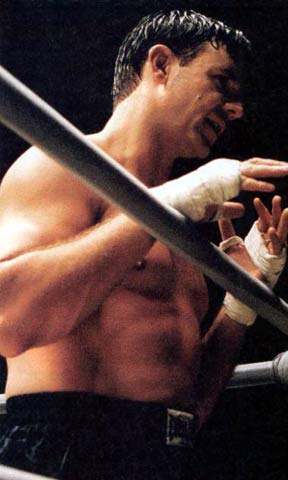|
Newsweek
- The
Heavyweight -
By Devin Gordon

He's an
Oscar-winning director, but gets flak for being a softie. With 'Cinderella
Man,' it's time to rethink Ron Howard.
Many directors have said it's a pleasure working
with the famously mercurial Russell Crowe. Ron Howard is not one of
them. "Directing Russell is like shooting on a tropical island,"
he says. "The weather is going to change several times a day,
but you're shooting there for a reason. Sometimes those dark clouds
are just what you need. And sometimes"—he laughs—"you
wish it would stop raining so you can do the sunny scene." Still,
Howard insists that he adores Crowe, and if he's lying, he must be
a masochist. The men are already planning a third collaboration even
though their second, "Cinderella Man," the true story of
boxer Jim Braddock's improbable rise to glory during the Depression,
doesn't open until June. It's a curious pairing. Howard, 51, is known
as one of the most genial guys in Hollywood; Crowe is not. But it
works. Crowe gets a director unfazed by his Vesuvian blasts and unintimidated
by his talent. And Howard gets from the actor something that his movies,
even the very good ones, have often needed: an edge.
To date, Ron Howard has made 17 films—a diverse
portfolio of thrillers, dramas, comedies and zero sequels—that
have grossed more than $1.3 billion in the United States alone. His
fee is about $10 million per movie, which is just down the street
from Mr. Spielberg's neighborhood. He's an Oscar winner (for 2002's
"A Beautiful Mind," his first film with Crowe) and a two-time
Directors Guild award winner. But among critics, cineastes and even
some in Hollywood, he can't seem to shake his rep as a cruiserweight—one
division shy of the big guns, more artisan than artist. "It's
a bummer that it doesn't compute the way it should," says Brian
Grazer, Howard's longtime producer at Imagine Entertainment. "There
are many directors who get fussed over a lot more than Ron and who
have had significantly less impact. But he's just such a no-fuss guy.
He doesn't wear all black clothes. He's not Paul Thomas Anderson—he
doesn't have three names. Maybe he should." "Cinderella
Man," which costars Renee Zellweger, who won an Oscar for "Cold
Mountain," and Paul Giamatti, whom we're prepared to nominate
right now for his supporting role as Braddock's corner man, is a vintage
Ron  Howard
film. Make that a vintage Ron William Howard film: a humble crowd-pleaser
with more intensity and elegance than at first appears. Just like
the guy who made it. Howard
film. Make that a vintage Ron William Howard film: a humble crowd-pleaser
with more intensity and elegance than at first appears. Just like
the guy who made it.
During his acceptance speech at the Golden Globes
for "A Beautiful Mind," Crowe praised
his director for his "honor as a man"—a comment that
upended perceptions of Howard as an affable softie. He was now a lion
tamer with the blessing of the biggest cat in the jungle. "I
think Russell believes the world is divided between guys who are men
and guys who are pussies," says Grazer.
"His speaking up for Ron was really important. It was essentially
him saying that Ron is a deeper person than anyone realizes. It was
our Brando going, 'Hey, this guy is good'." Says Crowe: "I
get involved in what I do, and that doesn't bother someone at ease
with himself like Ron is. He knows I'll never be as hard on him as
I am on myself on his behalf. And he's OK with that deal."
While filming "A Beautiful Mind," Crowe mentioned
to Howard that he would next make "Cinderella Man" with
director Lasse Halstrom ("Chocolat"). When the deal fell
through, Crowe lobbied his new pal to step in. Howard, coincidentally,
has had a lifelong interest in the Depression. As a high schooler,
he made a 30-minute documentary about the subject for his social-studies
class. "That was the end of dabbling for me, and the beginning
of
filmmaking," says Howard. He also admired the story of Braddock:
a decent family man and gifted fighter who lost every penny in the
Depression, got stripped of his boxing license and was reduced to
accepting handouts to feed his family—then jabbed his way back
to the top after getting one last chance in the ring. "Men felt
utterly degraded in that era," says Howard. "So many of
them disintegrated under the pressure. And Braddock didn't."
"Cinderella Man" may be an optimist's take
on a bleak era, but it's not the Depression Lite. And its searing
middle act should help answer the rap on Howard that he's not gritty
enough to excavate the ugliness of real life. "Ron said to me
when I first met him that he was interested not in a boxing movie
per se, but in making a drama about a family living through the Depression,"
says Giamatti. The film's most vivid sequence isn't a fight but a
quiet, tragic moment when Braddock's wife visits an old friend's massive
Manhattan apartment, now stripped bare except for a few chairs and
a rickety table. It's arguably Howard's specialty: an actors' moment.
Which explains why the best keep climbing in the ring
with him. On his next film, a tiny, under-the-radar thriller called
"The Da Vinci Code," for which he was hired by Columbia
studio chief Amy Pascal and producer John Calley, he'll direct Tom
Hanks for the third time, as well as Ian McKellen. "I'm just
not willing to make adjustments to try to change how people categorize
me," says Howard. "I guess that's the bottom line. Sure,
I notice it. Would I love to be everybody's darling? Of course."
Then he laughs. "Although, when you do this job long enough,
you notice that it never really lasts." Howard's more concerned
with making movies that will.
© 2005 Newsweek, Inc.
© 2005 MSNBC.com
|